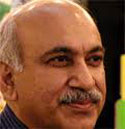
By M J Akbar
June 10, 2016
Can a boxer be a Gandhian? Howard Bingham, a friend of Muhammad Ali, asked the greatest pugilist of all time during an interview for Reader’s Digest, “How do you feel about different religions?” Ali, also the world’s most famous religious convert, replied: “Rivers, ponds, lakes, streams. They have different names, but all contain water. Religions have different names but all contain truth.” Could Mahatma Gandhi have put it better?
Can a boxer be a philosopher? Asked about his visibly brutal sport, Ali said, perhaps with the wistful seriousness disguised by a glib reputation: “It’s just a job. Grass grows, birds fly, waves pound the sand. I beat people up.” And how’s this for some practical philosophy? “The man who views the world at 50 the same as he did at 20 has wasted 30 years of his life.”
Why is boxing, intrinsically brutal, legal? Because we are schizophrenic about violence. We have to be. Violence is both the poison and the antidote of human nature. The only effective response to destructive violence is what might be termed constructive violence. A professional soldier or policeman is trained to be violent in the pursuit of a terrorist. Neither citizen nor the state can be protected from murder, mayhem or chaos by any other approach. Ashoka understood this even after his conversion to peace as the principle of policy after his bloody victory at Kalinga, which is why he never disbanded his army.
Every sport is a theatre of conflict. Ancient Rome believed it was the epitome of civilisation; we still acknowledge its genius. The most popular sport of the Roman empire was a fight between gladiators, which generally ended in the death of one combatant. This was a spectator sport, not a contest to determine the fate of armies and kingdoms. Death was mass entertainment. Quite often a defeated gladiator was put to the sword by the emperor’s wish or public uproar. Emperors knew that citizens had two non-negotiable demands: Bread and circus. The Roman did not live by bread alone.
Can violence be beautiful? Quite by coincidence, a few weeks before Ali’s death, I was reading David Remnick’s classic King of the World: Muhammad Ali and the Rise of an American Hero. “Boxing in America,” writes Remnick, “was born of slavery. Like the Roman emperors who gathered at the Colosseum to watch their warring chattel, Southern plantation owners amused themselves by putting together their strongest slaves and letting them fight it out for sport and gambling.” Ali was the Spartacus of America, the man who led the slave rebellion, fought his battles armed with art and chutzpah, and tortured his enemies with his success, achieved on their terms.
Remnick quotes Toni Morrison: “Ali was a beautiful warrior and he was reflecting a new posture for a black man. I don’t like boxing, but he was a thing apart.
His grace was almost appalling.” Ali delighted in the fact that he was beautiful, both in his art as well as in his perfectly sculpted body. “Ain’t I pretty?” he would ask over and over again, and that too was part of his revenge, for black in the psychology of slavery was also meant to be ugly. [Too many of us still want to be fair and handsome.] The American author Norman Mailer, reporting on an Ali fight in 1975, noted that women drew an audible breath when they saw him, and men looked away.
We have tweaked the meaning of civilisation to eliminate death as the price of defeat. The change took its time.
For more than a thousand years we replaced gladiators with either one-sided cruelty like bear-baiting, or a fight-to-death between animals. The human appetite for brutality is unmistakable. Cockfights must still be going on somewhere. There has been sudden speed in the evolution to a gentler consciousness in the last century; boxing itself has changed dramatically. But there is no sport without aggression. Till the 1970s and 1980s, defenders at the highest level of football routinely tried to hack an opposing striker’s knees or ankles, very often breaking them. Boxing tests the tensile strength of what we are prepared to accept.
When the great Joe Louis died, Ali noted that death had healed the tensions of his life, though he might not have phrased it quite like that. “From black folks to redneck Mississippi crackers, they loved him. They’re all crying. That shows you. Howard Hughes dies, with all his billions, not a tear. Joe Louis, everybody cried.”
When Muhammad Ali died, we all cried. That shows you.
Source: indianexpress.com
New Age Islam, Islam Online, Islamic Website, African Muslim News, Arab World News, South Asia News, Indian Muslim News, World Muslim News, Womens in Islam, Islamic Feminism, Arab Women, Womens In Arab, Islamphobia in America, Muslim Women in West, Islam Women and Feminism, Moderate Islam, Moderate Muslims, Progressive Islam, Progressive Muslims, Liberal Islam, Liberal Muslims, Islamic World News




 Moderate Islamist here
Moderate Islamist here


0 comments:
Post a Comment